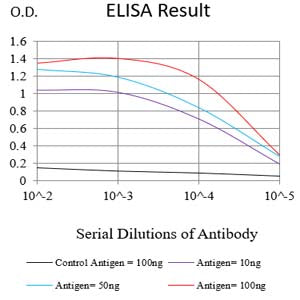
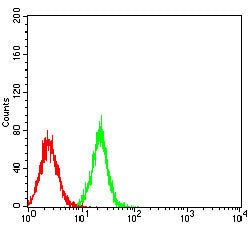
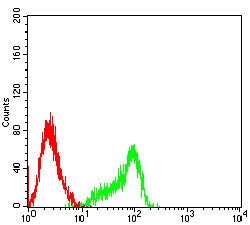
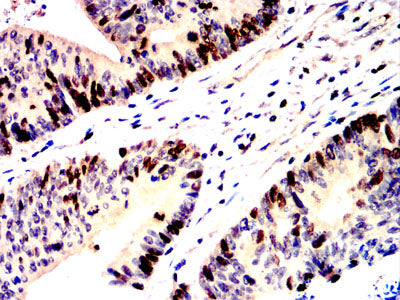
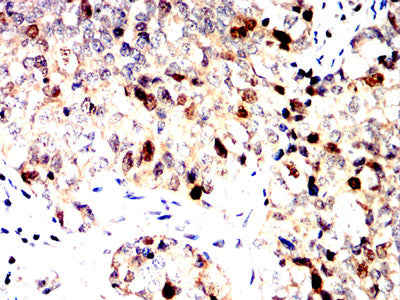
| WB | 咨询技术 | Human,Mouse,Rat |
| IF | 咨询技术 | Human,Mouse,Rat |
| IHC | 1/200 - 1/1000 | Human,Mouse,Rat |
| ICC | 技术咨询 | Human,Mouse,Rat |
| FCM | 1/200 - 1/400 | Human,Mouse,Rat |
| Elisa | 1/10000 | Human,Mouse,Rat |
| Aliases | Gem; MGORS6 |
| Entrez GeneID | 51053 |
| clone | 2H10G3 |
| WB Predicted band size | 23.6KDa |
| Host/Isotype | Mouse IgG1 |
| Antibody Type | Primary antibody |
| Storage | Store at 4°C short term. Aliquot and store at -20°C long term. Avoid freeze/thaw cycles. |
| Species Reactivity | Human, Rat |
| Immunogen | Purified recombinant fragment of human GMNN (AA: FULL 1-209) expressed in E. Coli. |
| Formulation | Purified antibody in PBS with 0.05% sodium azide |
+ +
以下是关于GMNN(Geminin)抗体的3篇代表性文献摘要整理:
1. **文献名称**:*Geminin regulates the transcriptional and epigenetic status of neuronal fate-promoting genes during mammalian neurogenesis*
**作者**:Lange, C., et al.
**摘要**:该研究利用GMNN抗体探究Geminin在神经分化中的作用,发现其通过抑制DNA复制的同时调控神经相关基因的染色质修饰,维持神经干细胞的增殖与分化平衡。
2. **文献名称**:*Cell cycle-dependent phosphorylation regulates RepID-mediated CRL4 complex assembly*
**作者**:Liu, X., et al.
**摘要**:研究通过GMNN抗体进行免疫共沉淀实验,揭示Geminin与CRL4泛素连接酶的相互作用机制,阐明其在细胞周期S/M期转换中的蛋白稳定性调控功能。
3. **文献名称**:*Geminin is required for Hox gene regulation to pattern the developing limb*
**作者**:Yakushiji-Kaminatsui, N., et al.
**摘要**:通过GMNN抗体的免疫组化分析,发现Geminin在四肢发育中通过调节Hox基因表达影响肢体分节模式,缺失GMNN会导致小鼠肢体形态异常。
---
**备注**:上述文献均使用GMNN抗体作为关键实验工具,研究方向涵盖细胞周期、发育生物学及表观遗传调控。建议通过PubMed或Google Scholar输入标题进一步获取全文细节。
GMNN (Geminin) is a cell cycle regulatory protein encoded by the GMNN gene, primarily known for its role in controlling DNA replication licensing during the S phase and mitosis. It acts as a key inhibitor of the replication initiator Cdt1. preventing re-replication by ensuring that DNA is copied only once per cell cycle. This regulation is critical for maintaining genomic stability and proper cell division. GMNN expression peaks during the S/G2 phases and is degraded via the ubiquitin-proteasome system during mitosis, allowing the next replication cycle to proceed. Beyond cell cycle control, GMNN participates in developmental processes, including neural differentiation and embryonic patterning, by interacting with transcription factors like Six3 and Hox proteins.
GMNN antibodies are essential tools in studying cell cycle dynamics, cancer biology, and developmental disorders. Overexpression of GMNN has been linked to tumorigenesis in various cancers (e.g., breast, liver, and colorectal), where it may promote proliferation or genomic instability. Conversely, its downregulation is associated with developmental defects. Researchers use GMNN-specific antibodies in techniques such as Western blotting, immunofluorescence, and immunohistochemistry to quantify protein levels, assess cell cycle status, and explore its interactions with binding partners. These studies contribute to understanding diseases linked to cell cycle dysregulation and potential therapeutic targeting of GMNN pathways.
×